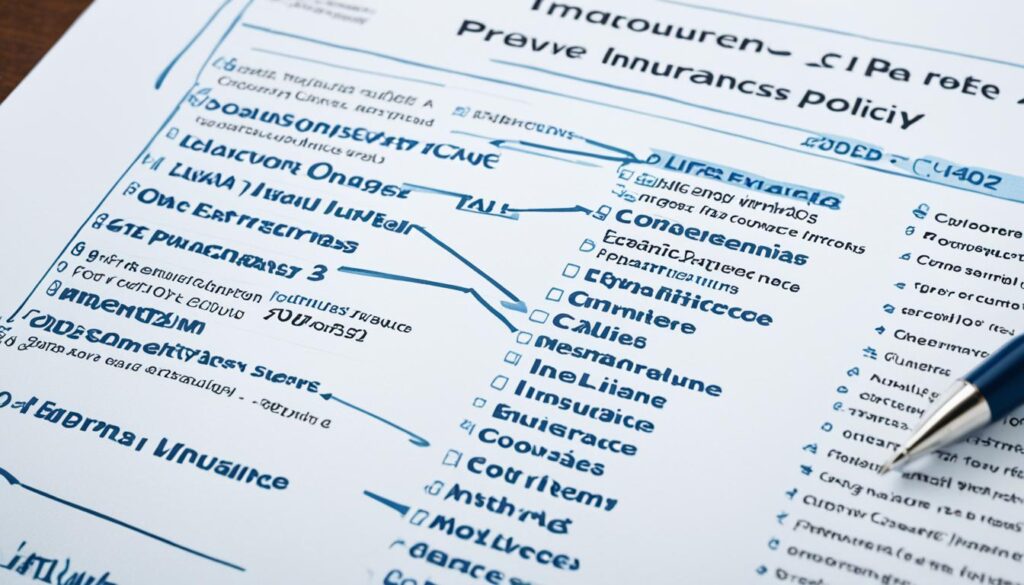Thinking about the future can be scary. But, planning ahead is key to understanding life insurance’s value. It’s a strong way to ensure financial security for you and your loved ones. It’s a promise that helps your family stay safe even when you’re not there.
A huge 44% of Americans say they’d face money troubles if a main breadwinner passed away. Life insurance acts as a safety net, giving you peace of mind. It comes in many forms, from affordable term policies to full coverage, fitting your life and budget.
Everyone needs life insurance, but women often get better rates because they live longer. Many people think it’s too expensive, but it’s actually a smart way to keep your family stable financially.
Key Takeaways:
- Understanding life insurance is key to maintaining family financial security.
- Confronting life’s uncertainties with solid future planning is essential.
- Life insurance prevents financial hardship and protects your dependents, ensuring they have a safety net for their future needs.
- Cost-effective term life insurance and versatile permanent life insurance options are available, tailored to different life stages and preferences.
- Transparent communication during the life insurance application process is critical to avoid fraud and ensure the policy’s validity.
- The choice between term and permanent life insurance will influence coverage duration and investment opportunities.
- Annuities and riders like the accelerated death benefit can further customize life insurance to fit individual needs and circumstances.
What Is Life Insurance?
Understanding life insurance is key to your financial planning. It’s a contract with an insurance company. You pay premiums, and they give your loved ones a death benefit when you pass away. This benefit helps cover costs and keeps your family’s finances safe.

Life insurance coverage options are many and varied. You can choose from term life or permanent life insurance, each with its own benefits. The right choice depends on your needs and finances.
| Type of Life Insurance | Coverage Period | Main Benefits | Typical Premium Cost |
|---|---|---|---|
| Term Life Insurance | 10, 20, 30 years | Lower premiums, suitable for temporary needs | Affordable |
| Permanent Life Insurance | Lifetime | Covers lifelong needs, can build cash value | Higher |
Life insurance helps with many things like paying off a mortgage, covering education costs, or helping your spouse with daily expenses. It’s important to keep making premium payments to keep your coverage.
The death benefit is crucial for your loved ones. It ensures they won’t be overwhelmed by debts or financial worries after you’re gone. When picking a life insurance policy, think about your family’s future, the life you want to give them, and the trustworthiness of the insurance company.
Look at your current finances and your goals for the future. Choose a policy that will protect your loved ones financially, giving them peace of mind even when you’re not there.
Types of Life Insurance
It’s important to know the different types of life insurance to pick the right one for your goals. Each type has special features for various needs. You can find affordable protection, investment chances, and coverage for your whole life.
Term Life Insurance
Term life insurance covers you for a set time, like 10, 20, or 30 years. It’s a budget-friendly option that doesn’t grow cash value but still offers a big death benefit. This is great if you want a simple, affordable way to protect your family if something happens to you.
Permanent Life Insurance
Permanent life insurance covers you for life. It includes whole and universal life insurance, both with cash value and death benefits.
Whole Life Insurance
Whole life insurance covers you for life with fixed premiums and a guaranteed cash value return. You can borrow against this cash value at any time. This makes whole life a top choice for lasting financial security.
Universal Life Insurance
Universal life insurance is known for its flexible premiums and death benefits. You can change how much you pay and when. The cash value grows based on market rates, giving you control over your insurance.

Choosing the Right Type of Life Insurance
Choosing the right life insurance depends on your finances, your family’s needs, and your future goals. Pick term life for simple, affordable coverage. Or choose whole or universal life for cash value and flexibility. Think about whether you want flexible payments or a steady cost in your budget.
Think of life insurance as a key step in securing your family’s future and finding peace of mind.
Term vs. Permanent Life Insurance
When looking at life insurance, it’s key to know the difference between term and permanent insurance. Each type has its own benefits for different financial and life situations. This can greatly affect your choice.

Term Life Insurance: Term life insurance is often seen as more affordable. It covers you for a set time, like 10, 20, or 30 years. It’s great for protecting your family or paying off a mortgage during tough times. The big thing to know is that term insurance doesn’t grow in value, making it a simple, budget-friendly option. This makes it a top pick for those wanting affordable coverage without a long-term commitment.
Permanent Life Insurance: Permanent insurance covers you for life if you keep paying premiums. It’s usually pricier because it lasts forever and can grow in value. This value can help with retirement, college, or emergencies. For seniors, it’s a solid choice for a lifetime of protection.
When comparing life insurance quotes, think about more than just the upfront cost. Consider the long-term benefits and growth each type offers. For instance, term insurance might look cheaper at first, but permanent insurance could give you more value over time. This is important if you’re planning for your future financially.
- Short-term needs and budget constraints? Consider term life insurance.
- Looking for a lifelong safety net and cash value benefits? Permanent life insurance may be more suitable.
Choosing between term or permanent life insurance depends on your financial situation and goals. Think about if building cash value with permanent insurance fits your financial plans. Or, if the simplicity and lower cost of term insurance are what you need right now. Always talk to a financial advisor to make the best choice for you.
Financial Security through Life Insurance
Life insurance is a key to security, ensuring your loved ones are taken care of if you’re not there. Many think it’s too expensive, but most people overestimate its cost. In reality, life insurance offers great benefits at a reasonable price.
Getting the right life insurance is smart and vital for your family’s future. It’s not just a luxury, but a necessary step in financial planning.
Protecting Your Loved Ones
Life insurance does more than just pay money. It’s crucial for families facing financial stress after losing a main income earner. Gen X and Millennials feel insecure about money, and many parents worry about their kids’ future without the main income.
The right life insurance policy is a safety net. It helps avoid financial crises. Most policyholders feel secure, while those without feel less so.
Planning for Future Needs
Planning for the future is essential, not just smart. Life insurance helps cover costs like childcare, home payments, and education, even after a loss. It’s important to talk about end-of-life plans, even if it’s hard.
Life insurance is key to financial planning, not just for now but for your family’s future. With a big need gap for life insurance, it’s time to see it as a vital asset for your family’s success.
